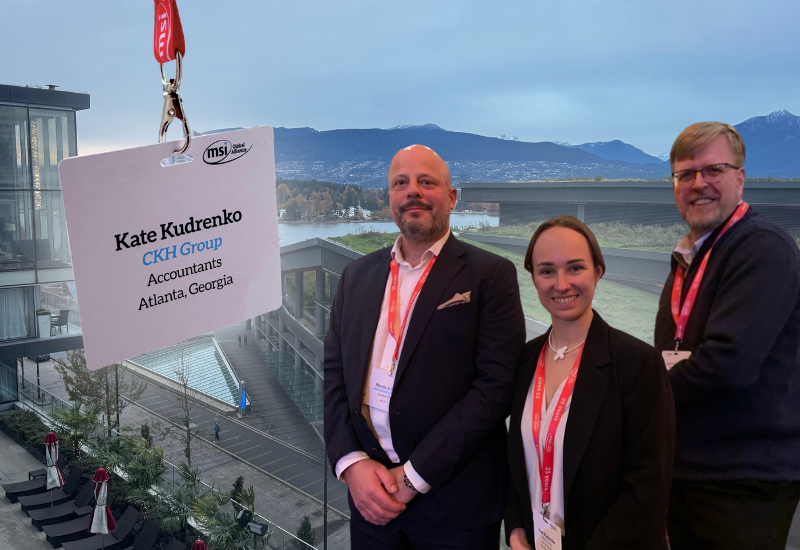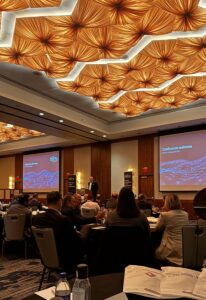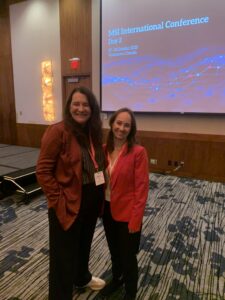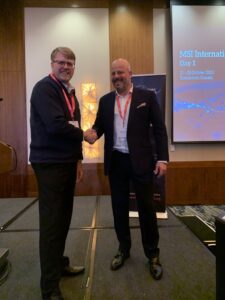5 Takeaways from the 2025 MSI International Conference
- November 5, 2025
- Posted by: CKH Group
- Categories: Financial Tips, OBBBA business, Tax tips

Accounting Insights: 5 Biggest Takeaways from the 2025 MSI International Conference
 Each year, the MSI Global Alliance, a worldwide network of independent legal and accounting firms, gathers its members for an international conference focused on innovation, collaboration, and the future of professional services. As the Atlanta, GA-based representative accounting firm within MSI, CKH Group’s CEO Kate Kudrenko and Chief Tax Officer Frank D’Urban Jackson were proud to attend this year’s members-only event in Vancouver, Canada.
Each year, the MSI Global Alliance, a worldwide network of independent legal and accounting firms, gathers its members for an international conference focused on innovation, collaboration, and the future of professional services. As the Atlanta, GA-based representative accounting firm within MSI, CKH Group’s CEO Kate Kudrenko and Chief Tax Officer Frank D’Urban Jackson were proud to attend this year’s members-only event in Vancouver, Canada.
MSI’s global membership is highly vetted, with one accounting firm and one law firm per geographic region chosen to represent the alliance. This selective structure allows for meaningful international partnerships, and equally meaningful insight into where our industry is heading.
At CKH Group, we’re sharing these exclusive accounting insights from inside the conference so that clients, colleagues, and professionals across the industry can stay connected to changes in the accounting industry. From sweeping tax reform to emerging technology and leadership trends, these are the five key takeaways from the 2025 MSI International Conference that every accounting professional should know.
1. Tax Reform Is Transforming the Playing Field
 It is no surprise that a recurring theme throughout the technical sessions was the monumental impact of the One Big Beautiful Bill Act (OB3) — the most extensive U.S. tax reform package since the Tax Cuts and Jobs Act. Sessions unpacked what this means for accountants, investors, and business owners navigating depreciation, R&D, and expensing rules.
It is no surprise that a recurring theme throughout the technical sessions was the monumental impact of the One Big Beautiful Bill Act (OB3) — the most extensive U.S. tax reform package since the Tax Cuts and Jobs Act. Sessions unpacked what this means for accountants, investors, and business owners navigating depreciation, R&D, and expensing rules.
Key Highlights:
- 100% Bonus Depreciation Returns (Post-OB3).
Businesses can now fully deduct the cost of eligible property in the year it’s placed in service, which is an advantage for those investing in machinery, equipment, or commercial property improvements. This resets what had been a declining schedule under the previous tax law (80% in 2023, 60% in 2024) back to a full 100% starting January 20, 2025. - New “Qualified Production Property (QPP)” Class.
QPP expands bonus depreciation eligibility to parts of new property placed in service in 2025: non-residential real estate directly used for manufacturing or production activities. For instance, a warehouse’s active production floor may now qualify for immediate expensing, even if office areas do not. - R&D Expense Flexibility Returns.
Section 174 amortization (which previously required spreading R&D expenses over five years) has been repealed. Companies may again immediately deduct domestic R&D costs, incentivizing innovation and restoring liquidity. - A New Era for Form 6765.
The IRS’s redesigned R&D credit form demands granular detail linking wages, projects, and qualified research expenses. Accountants will need improved documentation systems to remain compliant and claim full benefits.
Why it matters:
OB3 dramatically changes how businesses plan capital expenditures. Accountants and advisors must act now to identify qualifying assets, document R&D work properly, and time construction projects strategically to take advantage of 2025–2027 incentive windows.
2. Technology Is Accelerating, But Strategy Is the Missing Piece
MSI’s 2025 Global Technology Survey, presented by MSI CEO Martin Scott, highlighted the profession’s uneasy middle ground between innovation and implementation. Nearly every firm recognizes technology’s potential, yet few have mastered the strategy behind it.
Survey Insights:
- Nearly 70% of firms already use AI or automation tools, yet 50% still rely on paper files and only 30% have a centralized data strategy.
- 62% plan to increase tech spending, with goals centered on efficiency and client experience, not workforce reduction.
- Clients increasingly expect faster, more accurate, and transparent service, rather than lower costs.
In simpler terms: most firms are investing in tools, but not necessarily in transformation. Without a cohesive data strategy and structured change management, even advanced technologies can create inefficiency instead of solving it. It’s not enough for a firm to just adopt AI – at their core, they need to be focused on data management, efficiency, and strategy to improve all areas of technology.
Takeaway for accountants:
Digitalization isn’t about replacing people, it’s about empowering them. Successful firms will be those that pair strong technical systems with strategic leadership, helping clients navigate AI-driven insights while maintaining the trusted human judgment our industry is built on.
3. Trust-Based Leadership Is the New Competitive Edge
 In a profession often defined by technical precision, this year’s leadership keynote “What Does GREAT Look Like?” by Anne Cesak of Great Place To Work Canada, reminded attendees that culture remains a firm’s greatest long-term differentiator.
In a profession often defined by technical precision, this year’s leadership keynote “What Does GREAT Look Like?” by Anne Cesak of Great Place To Work Canada, reminded attendees that culture remains a firm’s greatest long-term differentiator.
Cesak outlined nine high-trust leader behaviors that shape culture and performance: listening, inspiring, caring, sharing, speaking, developing, thanking, hiring, and celebrating.
Her data-backed insights were compelling:
-
- The Fortune 100 Best Companies to Work For outperform the market by 3.5×, and
- Experience only one-third the voluntary turnover of their peers.
For accounting firms, where retention and engagement are top concerns, these findings are particularly relevant. Firms that cultivate psychological safety and recognize employees as trusted professionals build resilience, attract talent, and strengthen client relationships.
4. Private Client Advisory Is Getting Personal and Global
 MSI’s Private Clients & Estate Planning specialist group session delved into the future of high-net-worth advisory, an area evolving far beyond traditional wealth management.
MSI’s Private Clients & Estate Planning specialist group session delved into the future of high-net-worth advisory, an area evolving far beyond traditional wealth management.
According to MSI CEO Martin Scott, the global private client space is being reshaped by geopolitical tension, regulatory complexity, and a new generation of clients who expect tailored, transparent, and values-driven strategies.
Emerging Trends:
- Private markets expanding from $13 trillion today to an estimated $20 trillion by 2030.
- Private credit growing rapidly: projected to reach $3 trillion by 2028.
- Sustainable and impact investments gaining mainstream appeal.
- Insurance innovation adapting to climate risk and asset complexity.
Why it matters:
For advisors and accountants, the role is shifting from “planner” to “strategic interpreter.” It’s not just about numbers anymore; it’s about narrative, alignment, and global coordination. The modern client wants their financial strategy to reflect their values as much as their balance sheet.
5. Trade Turbulence Is Testing Strategic Agility
International trade and tariff reform also took center stage, with Diaz Trade Law outlining the dramatic policy changes following the 2025 Reciprocal Tariff initiative under the International Emergency Economic Powers Act (IEEPA).
New tariffs including 50% duties on imports from India and 20% on Vietnam and Taiwan are redefining cost structures and compliance challenges. Eight ongoing lawsuits have challenged the policy’s legality, but until the Supreme Court rules, importers must navigate heightened enforcement risk.
Practical Implications for Accounting Firms:
- Help clients conduct supply chain and import audits to assess exposure.
- Leverage duty drawback and tariff engineering to recover or minimize costs.
- Avoid shortcuts. The Department of Justice has elevated customs fraud enforcement to a top national priority.
In today’s global environment, accountants play a crucial role not only in compliance but in strategic decision-making. Those who understand how trade policy impacts cash flow, sourcing, and pricing will provide indispensable value to clients navigating uncertainty.
Looking Ahead: The Future of Accounting
 The 2025 MSI International Conference made one thing clear: the accounting profession is entering a new era one defined by integration between tax and technology, leadership and culture, trade and advisory.
The 2025 MSI International Conference made one thing clear: the accounting profession is entering a new era one defined by integration between tax and technology, leadership and culture, trade and advisory.
As the Atlanta member firm of the MSI Global Alliance, CKH Group remains committed to bringing our clients the benefit of that international collaboration by combining global expertise with local insight.
Want to know more or talk to a trusted accountant? Contact Us to connect with a CKH Group advisor today. You can also call us at 1-770-495-9077 or email us at [email protected].
The above article only intends to provide general financial information and is based on open-source facts, it is not designed to provide specific advice or recommendations for any individual. It does not give personalized tax, financial, or other business and professional advice. Before taking any form of action, you should consult a financial professional who understands your particular situation. CKH Group will not be held liable for any harm/errors/claims arising from the articles. Whilst every effort has been taken to ensure the accuracy of the contents, we will not be held accountable for any changes that are beyond our control.
